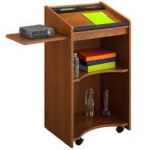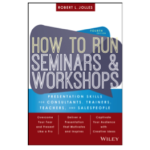 When it comes to standing up in front of a room and speaking, there are certain things that can be extremely useful to any speaker, but one poor aid seems to get very little love. People are so confused by this particular piece of furniture that 99% of them can’t even pronounce its name correctly. I’m talking about the lectern.
When it comes to standing up in front of a room and speaking, there are certain things that can be extremely useful to any speaker, but one poor aid seems to get very little love. People are so confused by this particular piece of furniture that 99% of them can’t even pronounce its name correctly. I’m talking about the lectern.
For some time, arguments have been made for, and against, the use of lecterns. The key argument against the lectern is that nervous presenters have a tendency to hold onto them. This not only eliminates mobility, but it also impacts the speaker’s ability to gesture freely. Without question, that is a habit you need to avoid. When you look at the advantages of using a lectern, however, you will find that this problem seems somewhat trivial.
The lectern’s most important advantage is that, with a wireless lavalier microphone, it actually allows you more mobility. Let’s begin with the assumption that you need to look at your notes when you speak, or at least have some sort of guide to help you. With a lectern, you can actually get comfortable strolling back and forth across a stage knowing that you can work your way back to the lectern when you need to glance at your notes.
The key here is glance. A lectern is typically taller than a desk or table, so it allows you to peek at your notes in a subtle way. That ability to sneak a little peek makes the lectern worth its weight in gold. It gives you the confidence to leave your notes, knowing that help is only a few steps away. If the material is located on a desk, and unless you have super vision, you will probably have to bend over to take a look. Through my thirty plus years as a professional speaker, and the many, many subtle sideway glances I’ve made as I have strolled by the lectern, I have developed my own version of a super vision. I’m not sure how great my normal vision is looking straight ahead, but I can truly read my notes better when they are raised and to the side of me than straight ahead of me!
The lectern gives you another advantage; you have the ability to conceal strategic materials from the audience. If you have an object you’d like to conceal, or if you are planning a competition with some prizes, the lectern provides a great place to store those little surprises. There are many things you may want to store in the lectern; a clock, your laptop, your remote, a bottle of water, Post-It reminders, or almost anything else you can name. Those objects can often fit on top of, or inside, a lectern. As a matter of fact, I can usually learn all I need to know about a presenter by what he or she has put inside the lectern.
There is one last point that I would like to clear up: People often confuse the words “podium” and “lectern.” Ninety-nine percent of the people you meet will call the thing that a presenter stands behind… a podium. For the record, Webster’s New World Dictionary defines a podium in this way:
A low platform, esp. for the conductor of an orchestra.
Although presenters can perform many exciting tasks in a presentation, I’ve not heard of someone who has conducted an orchestra! A lectern is defined this way:
A tall stand with a sloping top to hold notes, a book, or a written speech, etc., as of a lecturer.
Used properly, a lectern can be one of the most helpful presenting tools available to a speaker. You can even purchase portable lecterns that fold up and can be carried like a briefcase. So when it comes to using a lectern, my recommendation is this: Don’t leave home without it. Regarding the habit of holding onto the lectern, just leave yourself a note on the lectern that says something like this: “Hands off and move!” That should do the trick!


This rings so true, Rob! I think your most important point here is the first one you make – like any great friendship, a speaker’s relationship with a lectern needs its distance. So – it needs to be a support without being a crutch. Similarly, the lack of an appropriate lectern can actually cripple a good speaker!
You’ve got that right, and because of these concerns, many shy away from the use of a lectern altogether. But used properly, it can help transform a presenter, and his or her delivery into something special. Thanks for the post Nick!
Thanks Rob for the great article! I agree with the above comment too – a lectern is a supporting tool.
So under estimated, I’ve been known to grab a music stand if a lectern can’t be found. I appreciate the post Hui!
I just remember that podium came from a Greek word, podiom, which meant ‘foot.’ If you can stand on it, it must be a podium. Unless you build your own lecturn with a little step to compensate for being a shorty. Would that then be called a “podiurn or a lectium?
I’m going with “podiurn” because you’re stepping into it… and because you’re nutty enough to come up with it! Always great hearing from a trainer I served side-by-side with at Xerox over 25 years ago. thanks for the post Micky!
Great points Rob! So glad you clarified the terms for readers. As you stated, many people use the wrong term for the presenter’s best friend. Your points are well taken. I also liked that you said “glance” at the notes not stand and read the notes. That is an important point. Also, it demonstrates the speaker has respect for the audience and prepared for the event.
If we don’t “glance” that lectern becomes a crutch and now it begins to take away from our delivery. In real estate they say, “location, location, location.” In the world of presenting it’s, “preparation, preparation, preparation.” Thanks for posting Phyllis!
Great tips, Rob. My Toastmasters clubs discouraged the use of the lecturn. It is refreshing to see another viewpoint to embrace it when appropriate.
Well… as a former member of Toastmasters, and former Educational VP, I’ve got to go against the clubs on this one. Clearly, the clubs are afraid the lectern will promote clutching, but as I mentioned, there are way, way too many positives that can come from the lectern. When conducting training, I don’t think there’s even an option not to use it. The real irony is that when used properly the lectern will reduce the amount of time looking at our notes! Thanks for posting Scott.